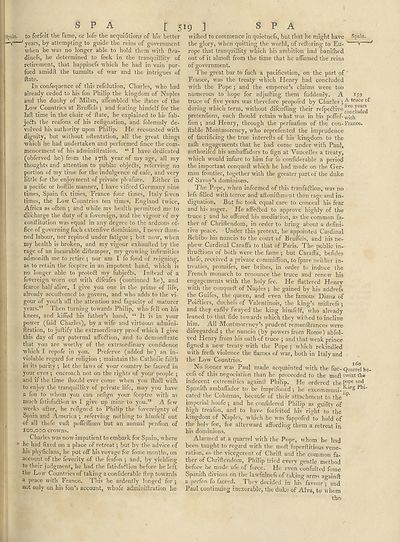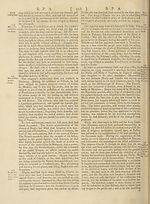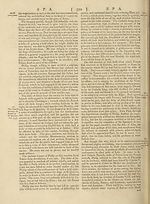Encyclopaedia Britannica, or, a Dictionary of arts, sciences, and miscellaneous literature : enlarged and improved. Illustrated with nearly six hundred engravings > Volume 19, Scripture-SUG
(567) Page 519
Download files
Complete book:
Individual page:
Thumbnail gallery: Grid view | List view

i
SPA [ 519 ] SPA
to forfeit the fame, or lofe the acquifitions of his better
years, by attempting to guide the reins of government
when he was no longer able to hold them with ftea-
dinefs, he determined to feek in the tranquillity of
retirement, that happinefs which he had in vain pur-
fued amidft the tumults of war and the intrigues of
ftate.
In confequence of this refolution, Charles, who had
already ceded to his fon Philip the kingdom of Naples
and the duchy of Milan, affembled the Hates of the
Low Countries at Bruffels •, and feating himfelf for the
laft time in the chair of (late, he explained to his fub-
je£ts the reafons of his refignation, and folemnly de¬
volved his authority upon Philip. He recounted with
dignity, but without oftentation, all the great things
which he had undertaken and performed fince the com¬
mencement of his adminiitration. “ I have dedicated
(obferved he) from the 17th year of my age, all my
thoughts and attention to public objects, referving no
portion of my time for the indulgence of eafe, and very
little for the enjoyment of private pleafure. Either in
a pacific or hoftile manner, I have vifited Germany nine
times, Spain fix times, France four times, Italy feven
times, the Low Countries ten times, England twice,
Africa as often •, and while my health permitted me to
difcharge the duty of a fovereign, and the vigour of my
eonftitution was equal in any degree to the arduous of¬
fice of governing fuch extenfive dominions, I never fhun-
ned labour, nor repined under fatigue 5 but now, when
my health is broken, and my vigour exhaufted by the
rage of an incurable diftemper, my growing infirmities
admonifh me to retire ; nor am I fo fond of reigning,
as to retain the fceptre in an impotent hand, which is
no longer able to proteft my fubjefts. Inftead of a
fovereign worn out with difeafes (continued he), and
fcarce half alive, I give you one in the prime of life,
already accuftomed to govern, and who adds to the vi¬
gour of youth all the attention and fagacity of maturer
years.” Then turning towards Philip, who fell on his
knees, and kifie-d his father’s hand, “ It is in your
power (faid Charles), by a wife and virtuous admini-
flration, to juftify the extraordinary proof which I give
this day of my paternal affeftion, and to demonilrate
that you are worthy of the extraordinary confidence
which I repofe in you. Preferve (added he) an in¬
violable regard for religion •, maintain the Catholic faith
in its purity ; let the laws of your country be facred in
your eyes •, encroach not on the rights of your people •,
and if the time fiiould ever come when you {hall wifh
to enjoy the tranquillity of private life, may you have
a fon to whom you can refign your fceptre with as
much fatisfadlion as I give up mine to you.” A few
weeks after, he refigned to Philip the fovereignty of
Spain and America ; referving' nothing to himfelf out
of all thefe vaft pofleffions but an annual penfion of
100,000 crowns.
Charles was now’ impatient to embark for Spain, where
he had fixed on a place of retreat; but by the advice of
his phyficians, he put off his voyage for fome months, on
account of the feverity of the feafon ; and, by yielding
to their judgment, he had the fatisfaOlion before he left
the Low Countries of taking a confiderable (lep towards
a peace with France. This he ardently longed for •,
not only on his fon’s account, whofe adminiftration he
v'iftied to commence in quietnefs, but that he might have Spain,
the glory, when quitting the world, of reftoring to Eu- v
rope that tranquillity which his ambition had banifhed
out of it almoft from the time that he affumed the reins
of government.
The great bar to fuch a pacification, on the part of
France, was the treaty which Henry had concluded
with the Pope 5 and the emperor’s claims were too
numerous to hope for adjulling them fuddenly. A 159
truce of five years was therefore propofed by Charles ; ^ truce of
during which term, without difeuffing their refpedfive
pretenfions, each fhould retain what was in his poffef-w;th
fion ; and Henry, through the perfuafion of the con-France,
liable Montmorency, wTho reprefented the imprudence
of facrifieing the true interells of his kingdom to the
rafh engagements that he had come under wfith Paul,
authorifed his ambafladors to fign at Vaucelles a treaty,
which would infure to him for fo confiderable a period
the important conqueft which he had made on the Ger¬
man frontier, together with the greater part of the duke
of Savoy’s dominions.
1 he Pope, when informed of this tranfaflion, was no
lefs filled with terror and aftonilhment than rage and in¬
dignation. But he took equal care to conceal his fear
and his anger. He affe<ffed to approve highly of the
truce ; and he offered his mediation, as the common fa¬
ther of Chrillendom, in order to bring about a defini¬
tive peace. Under this pretext, he appointed Cardinal
Rebibo his nuncio to the court of Bruffels, and his ne¬
phew Cardinal Caraffa to that of Paris. The public in-
ilru6!ions of both were the fame ; but Caraffa, befides
thefe, received a private commiffion, to fpare neither in¬
treaties, promifes, nor bribes, in order to induce the
French monarch to renounce the truce and renew' his
engagements with the holy fee. He flattered Henry
with the conqueff of Naples ; he gained by his addrefs
the Guifes, the queen, and even the famous Diana of
Poicliers, duehefs of Valentinois, the king’s millrefs ;
and they eafily fwayed the king himfelf, who already
leaned to that fide towards which they withed to incline
him. All Montmorency’s prudent remonftrances were
difregarded ; the nuncio (by powers from Rome) abfol-
ved Henry from his oath of truce ; and that weak prince
figned a new treaty with the Pope ; which rekindled
with frefli violence the flames of war, both in Italy and
the Low Countries.
No fooner was Paul made acquainted with the fuc-Quarrel be-
cefs of this negociation than he proceeded to the mofl twixt the
indecent extremities againl) Philip. He ordered theP°Peand.
Spanifh ambaffador to be imprifoned ; he excommuni-Iiir!g Phl“
cated the Colonnas, becaufe of their attachment to the P
imperial houfe ; and he confidered Philip as guiltv of
high treafon, and to have forfeited his right to the
kingdom of Naples, which he was fuppofed to hold of
the holy fee, for afterward affording them a retreat in
his dominions.
Alarmed at a quarrel with the Pope, whom he had
been taught to regard with the moft fuperftitious vene¬
ration, os the vicegerent of Chrift and the common fa¬
ther of Chriftendom, Philip tried every gentle method
before he made ufe of force. He even confulted fome
Spanifh divines on the law'fulnefs of taking arms agamft
a perfon fo facred. They decided in his favour f and
Paul continuing inexorable, the duke of Alva, to whom
the
SPA [ 519 ] SPA
to forfeit the fame, or lofe the acquifitions of his better
years, by attempting to guide the reins of government
when he was no longer able to hold them with ftea-
dinefs, he determined to feek in the tranquillity of
retirement, that happinefs which he had in vain pur-
fued amidft the tumults of war and the intrigues of
ftate.
In confequence of this refolution, Charles, who had
already ceded to his fon Philip the kingdom of Naples
and the duchy of Milan, affembled the Hates of the
Low Countries at Bruffels •, and feating himfelf for the
laft time in the chair of (late, he explained to his fub-
je£ts the reafons of his refignation, and folemnly de¬
volved his authority upon Philip. He recounted with
dignity, but without oftentation, all the great things
which he had undertaken and performed fince the com¬
mencement of his adminiitration. “ I have dedicated
(obferved he) from the 17th year of my age, all my
thoughts and attention to public objects, referving no
portion of my time for the indulgence of eafe, and very
little for the enjoyment of private pleafure. Either in
a pacific or hoftile manner, I have vifited Germany nine
times, Spain fix times, France four times, Italy feven
times, the Low Countries ten times, England twice,
Africa as often •, and while my health permitted me to
difcharge the duty of a fovereign, and the vigour of my
eonftitution was equal in any degree to the arduous of¬
fice of governing fuch extenfive dominions, I never fhun-
ned labour, nor repined under fatigue 5 but now, when
my health is broken, and my vigour exhaufted by the
rage of an incurable diftemper, my growing infirmities
admonifh me to retire ; nor am I fo fond of reigning,
as to retain the fceptre in an impotent hand, which is
no longer able to proteft my fubjefts. Inftead of a
fovereign worn out with difeafes (continued he), and
fcarce half alive, I give you one in the prime of life,
already accuftomed to govern, and who adds to the vi¬
gour of youth all the attention and fagacity of maturer
years.” Then turning towards Philip, who fell on his
knees, and kifie-d his father’s hand, “ It is in your
power (faid Charles), by a wife and virtuous admini-
flration, to juftify the extraordinary proof which I give
this day of my paternal affeftion, and to demonilrate
that you are worthy of the extraordinary confidence
which I repofe in you. Preferve (added he) an in¬
violable regard for religion •, maintain the Catholic faith
in its purity ; let the laws of your country be facred in
your eyes •, encroach not on the rights of your people •,
and if the time fiiould ever come when you {hall wifh
to enjoy the tranquillity of private life, may you have
a fon to whom you can refign your fceptre with as
much fatisfadlion as I give up mine to you.” A few
weeks after, he refigned to Philip the fovereignty of
Spain and America ; referving' nothing to himfelf out
of all thefe vaft pofleffions but an annual penfion of
100,000 crowns.
Charles was now’ impatient to embark for Spain, where
he had fixed on a place of retreat; but by the advice of
his phyficians, he put off his voyage for fome months, on
account of the feverity of the feafon ; and, by yielding
to their judgment, he had the fatisfaOlion before he left
the Low Countries of taking a confiderable (lep towards
a peace with France. This he ardently longed for •,
not only on his fon’s account, whofe adminiftration he
v'iftied to commence in quietnefs, but that he might have Spain,
the glory, when quitting the world, of reftoring to Eu- v
rope that tranquillity which his ambition had banifhed
out of it almoft from the time that he affumed the reins
of government.
The great bar to fuch a pacification, on the part of
France, was the treaty which Henry had concluded
with the Pope 5 and the emperor’s claims were too
numerous to hope for adjulling them fuddenly. A 159
truce of five years was therefore propofed by Charles ; ^ truce of
during which term, without difeuffing their refpedfive
pretenfions, each fhould retain what was in his poffef-w;th
fion ; and Henry, through the perfuafion of the con-France,
liable Montmorency, wTho reprefented the imprudence
of facrifieing the true interells of his kingdom to the
rafh engagements that he had come under wfith Paul,
authorifed his ambafladors to fign at Vaucelles a treaty,
which would infure to him for fo confiderable a period
the important conqueft which he had made on the Ger¬
man frontier, together with the greater part of the duke
of Savoy’s dominions.
1 he Pope, when informed of this tranfaflion, was no
lefs filled with terror and aftonilhment than rage and in¬
dignation. But he took equal care to conceal his fear
and his anger. He affe<ffed to approve highly of the
truce ; and he offered his mediation, as the common fa¬
ther of Chrillendom, in order to bring about a defini¬
tive peace. Under this pretext, he appointed Cardinal
Rebibo his nuncio to the court of Bruffels, and his ne¬
phew Cardinal Caraffa to that of Paris. The public in-
ilru6!ions of both were the fame ; but Caraffa, befides
thefe, received a private commiffion, to fpare neither in¬
treaties, promifes, nor bribes, in order to induce the
French monarch to renounce the truce and renew' his
engagements with the holy fee. He flattered Henry
with the conqueff of Naples ; he gained by his addrefs
the Guifes, the queen, and even the famous Diana of
Poicliers, duehefs of Valentinois, the king’s millrefs ;
and they eafily fwayed the king himfelf, who already
leaned to that fide towards which they withed to incline
him. All Montmorency’s prudent remonftrances were
difregarded ; the nuncio (by powers from Rome) abfol-
ved Henry from his oath of truce ; and that weak prince
figned a new treaty with the Pope ; which rekindled
with frefli violence the flames of war, both in Italy and
the Low Countries.
No fooner was Paul made acquainted with the fuc-Quarrel be-
cefs of this negociation than he proceeded to the mofl twixt the
indecent extremities againl) Philip. He ordered theP°Peand.
Spanifh ambaffador to be imprifoned ; he excommuni-Iiir!g Phl“
cated the Colonnas, becaufe of their attachment to the P
imperial houfe ; and he confidered Philip as guiltv of
high treafon, and to have forfeited his right to the
kingdom of Naples, which he was fuppofed to hold of
the holy fee, for afterward affording them a retreat in
his dominions.
Alarmed at a quarrel with the Pope, whom he had
been taught to regard with the moft fuperftitious vene¬
ration, os the vicegerent of Chrift and the common fa¬
ther of Chriftendom, Philip tried every gentle method
before he made ufe of force. He even confulted fome
Spanifh divines on the law'fulnefs of taking arms agamft
a perfon fo facred. They decided in his favour f and
Paul continuing inexorable, the duke of Alva, to whom
the
Set display mode to:
![]() Universal Viewer |
Universal Viewer | ![]() Mirador |
Large image | Transcription
Mirador |
Large image | Transcription
Images and transcriptions on this page, including medium image downloads, may be used under the Creative Commons Attribution 4.0 International Licence unless otherwise stated. ![]()
| Permanent URL | https://digital.nls.uk/192702653 |
|---|
| Attribution and copyright: |
|
|---|
| Description | Ten editions of 'Encyclopaedia Britannica', issued from 1768-1903, in 231 volumes. Originally issued in 100 weekly parts (3 volumes) between 1768 and 1771 by publishers: Colin Macfarquhar and Andrew Bell (Edinburgh); editor: William Smellie: engraver: Andrew Bell. Expanded editions in the 19th century featured more volumes and contributions from leading experts in their fields. Managed and published in Edinburgh up to the 9th edition (25 volumes, from 1875-1889); the 10th edition (1902-1903) re-issued the 9th edition, with 11 supplementary volumes. |
|---|---|
| Additional NLS resources: |
|

